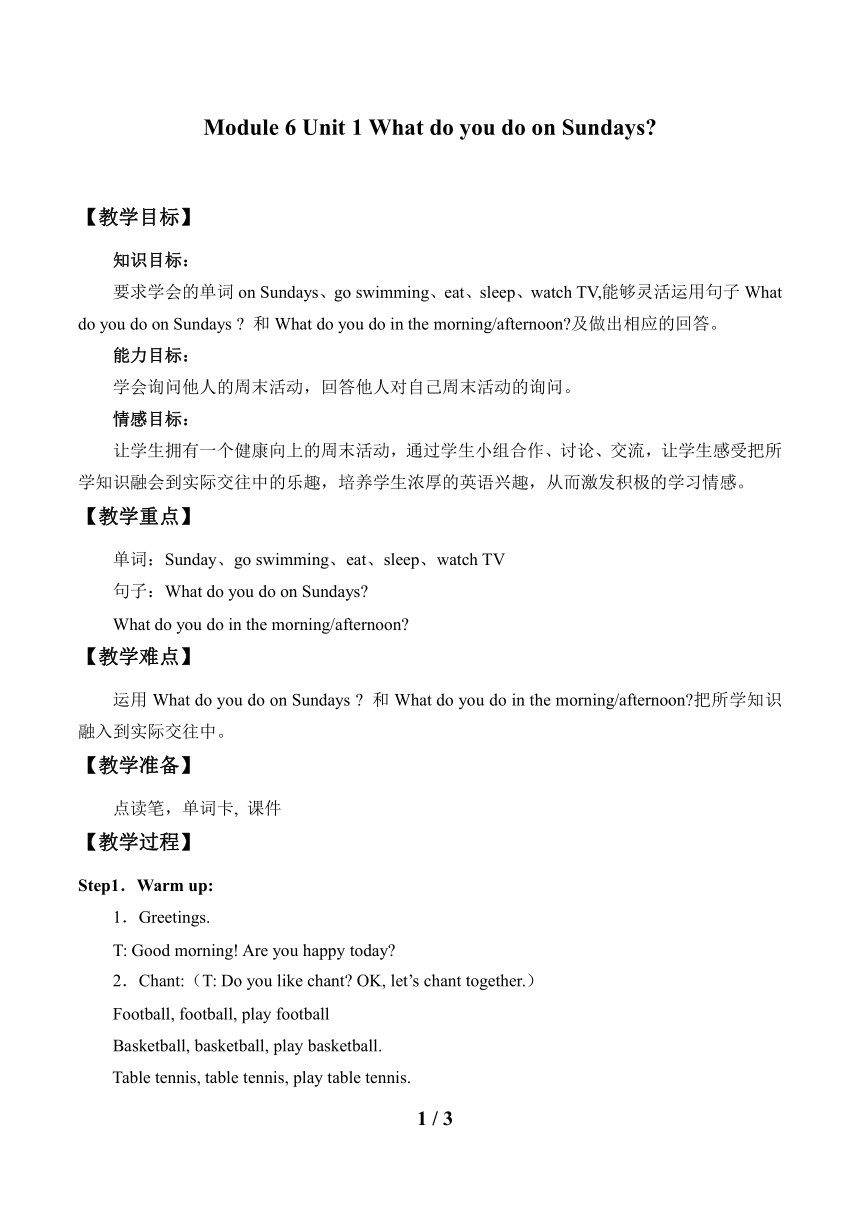Module6 Unit1 What do you do on Sundays?教案(含反思)
文档属性
| 名称 | Module6 Unit1 What do you do on Sundays?教案(含反思) |

|
|
| 格式 | doc | ||
| 文件大小 | 35.0KB | ||
| 资源类型 | 教案 | ||
| 版本资源 | 外研版(一年级起点) | ||
| 科目 | 英语 | ||
| 更新时间 | 2021-09-24 00:00:00 | ||
图片预览

文档简介
Module
6
Unit
1
What
do
you
do
on
Sundays?
【教学目标】
知识目标:
要求学会的单词on
Sundays、go
swimming、eat、sleep、watch
TV,能够灵活运用句子What
do
you
do
on
Sundays
?
和What
do
you
do
in
the
morning/afternoon?及做出相应的回答。
能力目标:
学会询问他人的周末活动,回答他人对自己周末活动的询问。
情感目标:
让学生拥有一个健康向上的周末活动,通过学生小组合作、讨论、交流,让学生感受把所学知识融会到实际交往中的乐趣,培养学生浓厚的英语兴趣,从而激发积极的学习情感。
【教学重点】
单词:Sunday、go
swimming、eat、sleep、watch
TV
句子:What
do
you
do
on
Sundays?
What
do
you
do
in
the
morning/afternoon?
【教学难点】
运用What
do
you
do
on
Sundays
?
和What
do
you
do
in
the
morning/afternoon?把所学知识融入到实际交往中。
【教学准备】
点读笔,单词卡,
课件
【教学过程】
Step1.Warm
up:
1.Greetings.
T:
Good
morning!
Are
you
happy
today?
2.Chant:(T:
Do
you
like
chant?
OK,
let’s
chant
together.)
Football,
football,
play
football
Basketball,
basketball,
play
basketball.
Table
tennis,
table
tennis,
play
table
tennis.
Swimming,
swimming,
go
swimming.
Shopping,
shopping,
go
shopping.
Homework,
homework,
do
my
homework.
Bike,
bike,
ride
a
bike.
TV,
TV,
watch
TV.
School,
school,
go
to
school.
Step2.Presentation
and
practice:
1.Lead
in
T:Thank
you!
Sit
down,
please.
Today,
let’s
have
a
competition.
If
you
do
a
good
job.You
can
get
one
point.
T:
What’s
this?
S:
It’s
a
cat.
T:
What’s
she
doing?
S:
She’s
eating
meat.
引出eat教授.
2.Look!
A
dog
is
coming!
There
is
an
interesting
story
about
them.
Let’s
look
and
listen.
After
listening,
tell
us.
Does
the
dog
ride
a
bike
on
Mondays?
今天,有只小猫和一只小狗发生了一个小故事,你们想知道吗?Now,
let’s
watch.
T:
Class,
on
Mondays,
I
go
to
school.
Do
you
go
to
school
on
Mondays?
S:
Yes,
I
do.
T:
Do
you
go
to
school
on
Saturdays?
S:
No,
I
don’t.
T:
What
do
you
do
on
Saturdays?
S:
...
3.T:
Here’s
a
calendar.
Can
you
say
the
days
of
the
week?
在此渗透中西时间的差异,在中国每周的第一天是周一,而在国外每周的开始是周日。
4.用Sunday做替换练习和pair
work
A:
What
do
you
do
on
Sundays?
B:
I….
5.让学生猜测老师每周日做什么。请学生进行提问“What
do
you
do
on
Sundays?”
老师介绍引出sleep
和in
the
morning教授。由in
the
morning拓展到in
the
afternoon和in
the
evening
6.Free
talk.
由谈论老师的周末活动引出谈论学生的周末活动,从而操练in
the
morning和
in
the
afternoon两个时间短语。
What
do
you
do
in
the
morning?
I…
in
the
morning.
What
do
you
do
in
the
afternoon?
I…
in
the
afternoon.
Step3:
Text
study
1.Listen
and
answer:
What
does
Sam
do
on
Sundays?
2.Look
at
the
flash
and
listen
to
it
again.
3.Follow
the
tape.
4.Read
the
text
together.
Step4.Extension
小记者做调查。
Step6.Homework:
1.Make
a
survey
for
your
parents.
2.Copy
the
new
words
and
read
the
text
for
15
minutes.
【课后反思】
为了达成教学目标我将整堂课分为四个环节。这四个环节以由浅到深、由易到难的步骤和真实的情景贯穿于整个课堂之中,过渡尽量做到自然、真实,预求让每个环节的目标都能得到很好的实现,让学生在真实有趣的情景中充分地练习和运用重点知识。在本节课的教学中,我通过真实有效的情景,激发了学生参与课堂活动的兴趣。在师生谈话中教授重点句型,使学生感受真实,使不同层面的学生都产生了说英语的欲望。使用多媒体进行直观教学出示例句,开始进行本课新知的正式学习。让学生直观感受新接触的句子,学生互问,达到知识的有效运用。这节课当中,采用灵活有效的活动进行知识的呈现、操练、巩固和拓展。同时,对学生们的及时表扬,让他们都能在回答或者参加活动后有一定的成就感。对于继续培养他们的兴趣是很有效果的。这样的拓展不仅培养了学生的迁移思维,而且让学生感受自信,提高了学习英语的兴趣。
PAGE
3
/
3
6
Unit
1
What
do
you
do
on
Sundays?
【教学目标】
知识目标:
要求学会的单词on
Sundays、go
swimming、eat、sleep、watch
TV,能够灵活运用句子What
do
you
do
on
Sundays
?
和What
do
you
do
in
the
morning/afternoon?及做出相应的回答。
能力目标:
学会询问他人的周末活动,回答他人对自己周末活动的询问。
情感目标:
让学生拥有一个健康向上的周末活动,通过学生小组合作、讨论、交流,让学生感受把所学知识融会到实际交往中的乐趣,培养学生浓厚的英语兴趣,从而激发积极的学习情感。
【教学重点】
单词:Sunday、go
swimming、eat、sleep、watch
TV
句子:What
do
you
do
on
Sundays?
What
do
you
do
in
the
morning/afternoon?
【教学难点】
运用What
do
you
do
on
Sundays
?
和What
do
you
do
in
the
morning/afternoon?把所学知识融入到实际交往中。
【教学准备】
点读笔,单词卡,
课件
【教学过程】
Step1.Warm
up:
1.Greetings.
T:
Good
morning!
Are
you
happy
today?
2.Chant:(T:
Do
you
like
chant?
OK,
let’s
chant
together.)
Football,
football,
play
football
Basketball,
basketball,
play
basketball.
Table
tennis,
table
tennis,
play
table
tennis.
Swimming,
swimming,
go
swimming.
Shopping,
shopping,
go
shopping.
Homework,
homework,
do
my
homework.
Bike,
bike,
ride
a
bike.
TV,
TV,
watch
TV.
School,
school,
go
to
school.
Step2.Presentation
and
practice:
1.Lead
in
T:Thank
you!
Sit
down,
please.
Today,
let’s
have
a
competition.
If
you
do
a
good
job.You
can
get
one
point.
T:
What’s
this?
S:
It’s
a
cat.
T:
What’s
she
doing?
S:
She’s
eating
meat.
引出eat教授.
2.Look!
A
dog
is
coming!
There
is
an
interesting
story
about
them.
Let’s
look
and
listen.
After
listening,
tell
us.
Does
the
dog
ride
a
bike
on
Mondays?
今天,有只小猫和一只小狗发生了一个小故事,你们想知道吗?Now,
let’s
watch.
T:
Class,
on
Mondays,
I
go
to
school.
Do
you
go
to
school
on
Mondays?
S:
Yes,
I
do.
T:
Do
you
go
to
school
on
Saturdays?
S:
No,
I
don’t.
T:
What
do
you
do
on
Saturdays?
S:
...
3.T:
Here’s
a
calendar.
Can
you
say
the
days
of
the
week?
在此渗透中西时间的差异,在中国每周的第一天是周一,而在国外每周的开始是周日。
4.用Sunday做替换练习和pair
work
A:
What
do
you
do
on
Sundays?
B:
I….
5.让学生猜测老师每周日做什么。请学生进行提问“What
do
you
do
on
Sundays?”
老师介绍引出sleep
和in
the
morning教授。由in
the
morning拓展到in
the
afternoon和in
the
evening
6.Free
talk.
由谈论老师的周末活动引出谈论学生的周末活动,从而操练in
the
morning和
in
the
afternoon两个时间短语。
What
do
you
do
in
the
morning?
I…
in
the
morning.
What
do
you
do
in
the
afternoon?
I…
in
the
afternoon.
Step3:
Text
study
1.Listen
and
answer:
What
does
Sam
do
on
Sundays?
2.Look
at
the
flash
and
listen
to
it
again.
3.Follow
the
tape.
4.Read
the
text
together.
Step4.Extension
小记者做调查。
Step6.Homework:
1.Make
a
survey
for
your
parents.
2.Copy
the
new
words
and
read
the
text
for
15
minutes.
【课后反思】
为了达成教学目标我将整堂课分为四个环节。这四个环节以由浅到深、由易到难的步骤和真实的情景贯穿于整个课堂之中,过渡尽量做到自然、真实,预求让每个环节的目标都能得到很好的实现,让学生在真实有趣的情景中充分地练习和运用重点知识。在本节课的教学中,我通过真实有效的情景,激发了学生参与课堂活动的兴趣。在师生谈话中教授重点句型,使学生感受真实,使不同层面的学生都产生了说英语的欲望。使用多媒体进行直观教学出示例句,开始进行本课新知的正式学习。让学生直观感受新接触的句子,学生互问,达到知识的有效运用。这节课当中,采用灵活有效的活动进行知识的呈现、操练、巩固和拓展。同时,对学生们的及时表扬,让他们都能在回答或者参加活动后有一定的成就感。对于继续培养他们的兴趣是很有效果的。这样的拓展不仅培养了学生的迁移思维,而且让学生感受自信,提高了学习英语的兴趣。
PAGE
3
/
3
同课章节目录
- Module 1
- Unit 2 I like football
- Unit 1 I like the ABC song.
- Module 2
- Unit 1 I don't like meat
- Unit 2 I don't like ginger.
- Module 3
- Unit 1 Do you like bananas?
- Unit 2 Do they like apples?
- Module 4
- Unit 1 Sam likes T-shirts.
- Unit 2 He doesn't like these trousers
- Module 5
- Unit 1 At 7,I get up.
- Unit 2 I go home at 5.
- Module 6
- Unit 1 What do you do on Sundays?
- Unit 2 Where do you live?
- Module 7
- Unit 1 How do you go to school?
- Unit 2 I go by train.
- Module 8
- Unit 1 She goes swimming.
- Unit 2 Does he play the piano?
- Module 9
- Unit 1 It's winter.
- Unit 2 What does he do in summer?
- Module 10
- Unit 1 Happy New Year!
- Unit 2 We have Christmas.
- Review Module
- unit 1
- unit 2
